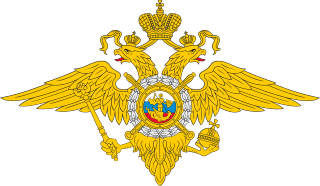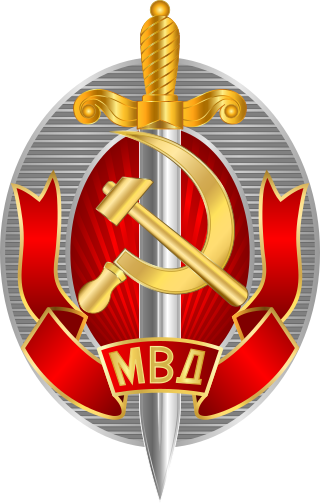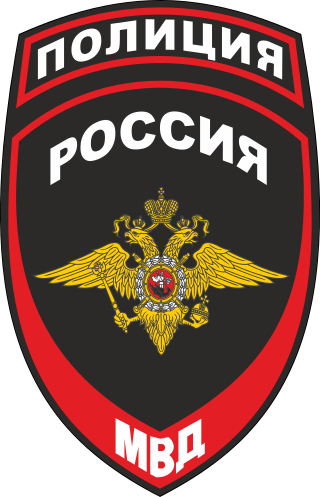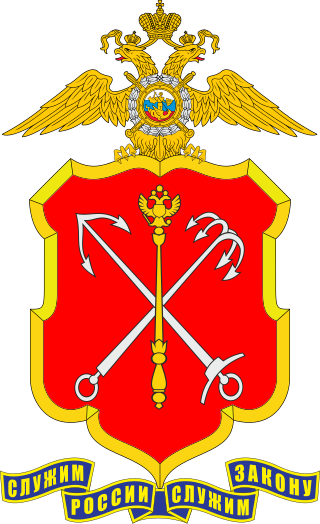
The Ministry of Internal Affairs of the Russian Federation is the interior ministry of Russia.
An interior minister is a cabinet official position that is responsible for internal affairs, such as public security, civil registration and identification, emergency management, supervision of regional and local governments, conduct of elections, public administration and immigration matters. This position is head of a department that is often called an interior ministry, a ministry of internal affairs or a ministry of home affairs. In some jurisdictions, there is no department called an "interior ministry", but the relevant responsibilities are allocated to other departments.

Militsiya was the name of the police forces in the Soviet Union and in several Eastern Bloc countries (1945–1992), as well as in the non-aligned SFR Yugoslavia (1945–1992). The term continues in common and sometimes official usage in some of the individual former Soviet republics such as Belarus, Tajikistan, Uzbekistan and Kyrgyzstan, as well as in the partially recognised or unrecognised republics of Abkhazia, South Ossetia, Transnistria, DNR and LNR.

Prince Viktor Pavlovich Kochubey ; was a Russian statesman and close aide of Alexander I of Russia. Of Ukrainian origin, he was a great-grandson of Vasily Kochubey. He took part in the Privy Committee that outlined Government reform of Alexander I. He served in London and Paris embassies as counsel, then as Ambassador to Turkey. In 1798 he was appointed to the board of College of Foreign Affairs and was made Count next year, but then Paul I of Russia exiled him. At the start of the reign of Alexander I, he joined the liberal Privy Committee that outlined Government reform of Alexander I. He was the Minister of Foreign Affairs in 1801–1802 and also Minister of the Interior until 1812, then in 1819–1825. Since 1827 he was the President of the State Council and Chairman of the Committee of Ministers. In 1834, he was granted the rank of Chancellor of the Russian Empire.

Count Sergey Kuzmich Vyazmitinov was a Russian general and statesman.

Alexander Dmitriyevich Balashov was a Russian general and statesman.

Imperial Moscow University was one of the oldest universities of the Russian Empire, established in 1755. It was the first of the twelve imperial universities of the Russian Empire. Its legacy is continued as Lomonosov Moscow State University, which occupies some of its original buildings.

Ministry of War of the Russian Empire, was an administrative body in the Russian Empire from 1802 to 1917.

The Ministry of Internal Affairs of the USSR was the interior ministry of the Soviet Union from 1946 to 1991.

The Police of Russia is the national law-enforcement agency in Russia, operating under the Ministry of Internal Affairs from September 8, [O.S. 20] 1802. It was established June 7, [O.S. 18] 1718 by decree from Peter the Great and in 2011, replacing the Militsiya, the former police service.

The Moscow Police, officially the Main Directorate of Internal Affairs of the City of Moscow, is the police force for Moscow, Russia.

The Saint Petersburg Police, officially the Main Administration for Internal Affairs of the City of St. Petersburg and the Leningrad Oblast is the state police force of Saint Petersburg and Leningrad Oblast, Russia. The main responsibilities of the service are the internal security, protection of human rights and freedoms, suppression and detection of crime, and protection of public order.

The Ministry of Internal Affairs of Dagestan is the interior ministry of Dagestan in southern Russia. The Ministry is headquartered in Makhachkala. As of 2012 the minister was Abdurashid Magomedov.

The Ministry of Interior in the Republic of Crimea is de facto the main police authority in Crimea in the Southern Federal District that was established by Russia after the 2014 Russian annexation of Crimea. Crimea is recognized as part of Ukraine by most of the international community.

The Council of Ministers of the Russian Empire was the highest executive authority of the Russian Empire, created in a new form by the highest decree of October 19, 1905 for the general "management and unification of the actions of the chief heads of departments on subjects of both legislation and higher state administration". The ministers ceased to be separate officials, responsible to the emperor, each only for their actions and orders.

The Committee of Ministers was the highest governmental body of the Russian Empire in 1802–1906. During the Revolution of 1905–07, it was replaced by the Council of Ministers of the Russian Empire.

The Ministry of Internal Affairs of the Russian Empire was the state executive authority of the Council of Ministers of the Russian Empire, which carried out administrative functions in the areas of state security, public security, law enforcement, leadership of local authorities, the fight against crime, protection of places of deprivation of liberty, the licensing system, and censorship in media and book publishing.

The Main Directorate for Public Order Maintenance of the Ministry of Internal Affairs of Russia is a structural unit of the central apparatus of the Ministry of Internal Affairs of Russia.

Ministerial Reform was one of the reforms of public administration of the Russian Empire, carried out at the beginning of the 19th century under Emperor Alexander I. The first stage of the reform occurred in 1802–1803, the second stage was carried out in 1810–1811. As a result of the reform, the ministries replaced the archaic collegiums.
















